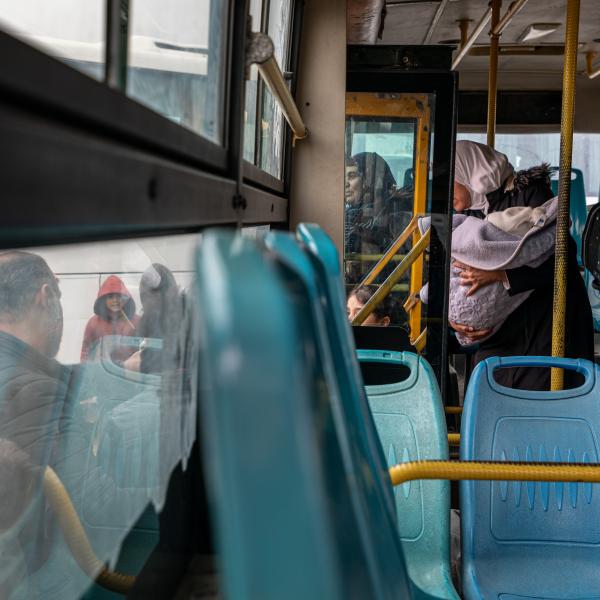After years of displacement, many Syrians are cautiously considering a return home.
Since December 2024, nearly 300,000 refugees have voluntarily returned to Syria, alongside over 829,000 internally displaced persons (IDPs) who have moved back to their areas of origin—equivalent to the combined population of Vaud and Basel.
Yet, rebuilding their lives is far from easy. Landmines and unexploded ordnance pose daily dangers, electricity remains unreliable, and a severe liquidity crisis has crippled the economy—where one in four Syrians is unemployed.
Millions of refugees are carefully assessing whether it is safe for them to return home. Some are eager to go, others are still waiting for more safety and stability. This uncertainty also affects the 20,000 or so Syrian refugees living in Switzerland.
Despite these challenges, returning Syrians are determined to rebuild their communities, find work, and create a future in their homeland. Their resilience deserves recognition and support.
Voices of Syrian families considering return – and how UNHCR supports them
On a visit to Syria and its neighbours, UN High Commissioner for Refugees Filippo Grandi meets families heading home and says more support is vital to ensure returns are a success.
After 13 years in Jordan, 80-year-old Hassan Mohammad Alhassan wondered if he would ever return to Syria.
But on 30 January, as he boarded a bus from Amman to Homs, his uncertainty faded, replaced by a broad smile.
“We have lived in Jordan as if it were our own country. Thirteen years have passed, and we have never had any complaints,” Alhassan said.
“Now, as we return to our home country, it feels like being reborn. It’s as if we’re starting a new life.”

Dressed formally for the occasion in a suit and tie, with a scarf bearing Syria’s new three-starred flag draped around his shoulders, he explained his decision to return despite the challenges that lie ahead.
“Why? Because we will finally experience freedom and reconnect with our lives. I haven’t seen my sisters, brother or daughters for several years. That was all due to the previous political situation,” Alhassan said. “My house in Syria is destroyed; it needs repairs, and it will be costly. When I go back, I will check what remains of it and determine exactly what needs to be done.”
Alhassan and his family were among over 90 Syrian refugees on three UNHCR-organized buses from Amman to Damascus, Homs, and Daraa, part of a free return service launched on 20 January.
While more of the 6 million Syrian refugees may return in the coming months, many are still weighing political and security conditions. UNHCR emphasizes that returns must be voluntary and informed, with continued support for refugees and host countries.
Rebuilding Syria: what returning Syrian refugees need for sustainable recovery
After wishing Alhassan and the others well on their journey home, UN High Commissioner for Refugees Filippo Grandi – who was in Jordan on the last leg of a week-long visit that included Syria, Lebanon and Türkiye – described witnessing refugees returning home as “the most moving moment for any UNHCR worker.”
“These people need support. UNHCR is helping them travel back safely to Syria in cooperation with the Government of Jordan, which has been so generous all these years, and we will also be helping them on the Syria side,” Grandi added.
“They will need immediate assistance, but more than anything else, Syria needs a recovery programme – needs services, needs infrastructure, needs houses, needs jobs for the people who return and for all the people of Syria in this new era.”

Urgent needs for Syrian returnees
In Aleppo, which saw heavy destruction during the conflict, Grandi heard firsthand about the challenges facing Syrian returnees from Türkiye.
Issa, now 27, fled Syria at the age of 18. In February 2023, the earthquakes in Türkiye destroyed his home in Kahramanmaraş. After the former regime fell, he returned to Aleppo with his pregnant wife and three children.
“We have experienced so much,” Issa said. “I was in Aleppo, and it fell into destruction. I went to Türkiye and the earthquake happened, it was devastating. Now I’m back here, and it is still destroyed.”
The family is staying with relatives while they regain stability. Issa, a former coppersmith in Türkiye, emphasized the need for basic services to support refugee returns and reconstruction.
“There’s no electricity, water, internet, or jobs. How can we rebuild?” he asked. “If these services return, so will the people—Syria depends on it.”
Grandi emphasized UNHCR’s commitment to supporting returning refugees, internally displaced persons, and other vulnerable Syrians. Since December, nearly 300,000 have returned, receiving essential aid such as household items, winter supplies, psychological support, home repairs, identity documents, and emergency cash assistance.
“We must not forget the ongoing humanitarian crisis,” he said. “While the political transition offers new opportunities, continued support is crucial to ensure lasting returns.”
As more Syrians choose to return home, their resilience and determination shine through—but so do the immense challenges they face. With damaged infrastructure, limited job opportunities, and basic services still in crisis, sustainable and safe returns depend on continued humanitarian aid and long-term recovery efforts.
UNHCR remains committed to supporting returnees and ensuring their journey home is met with dignity, safety, and hope. Rebuilding Syria will take time, but with collective efforts and international support, returning families can begin to reclaim their futures and contribute to the recovery of their homeland.
Your support can help returning Syrians rebuild their homes and communities. Donate today.